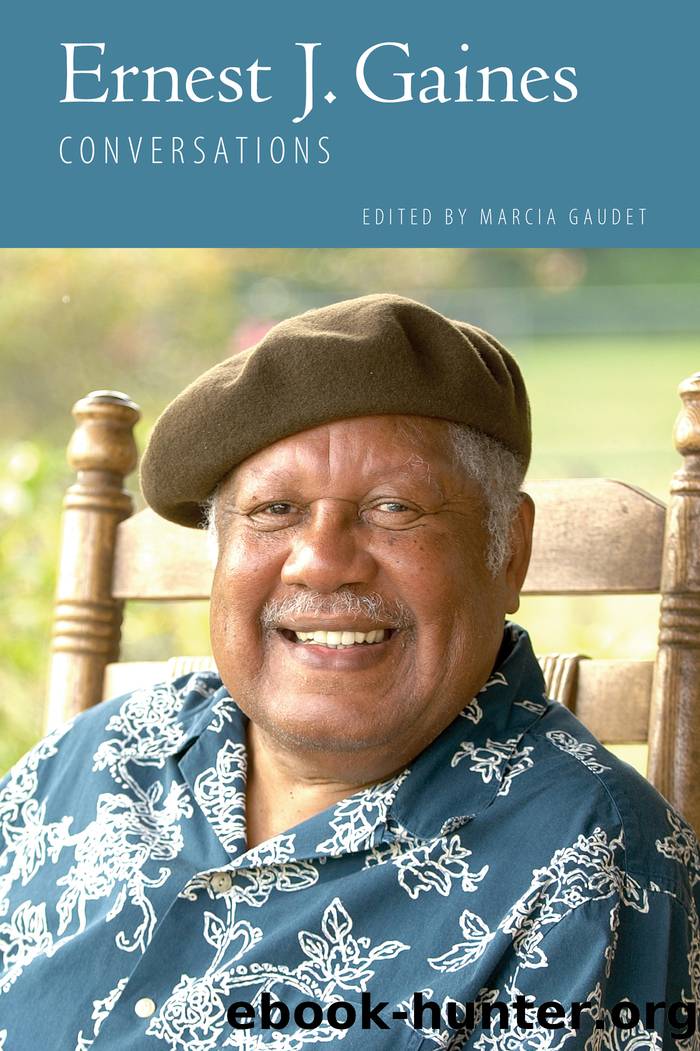Ernest J. Gaines by Conversations (retail)

Author:Conversations (retail)
Language: eng
Format: epub
Publisher: University Press of Mississippi
Published: 2019-06-15T00:00:00+00:00
The Influence of Multi-Art Forms on the Fiction of Ernest J. Gaines
Marcia Gaudet and Darrell Bourque / 2002
From Interdisciplinary Humanities 20:1 (2003): 76â92. Reprinted with permission.
This interview was conducted on December 17, 2002, at the home of Ernest Gaines, near the University of Louisiana at Lafayette campus. At the time, Gaines, Gaudet, and Bourque had been friends and colleagues in the UL Lafayette English Department for over twenty years.
DARRELL BOURQUE: That whole idea of influence or use or whatever you want to call it is really broad. I mean, to a large extent any of us who are writers or musicians or visual artists are all influenced by the larger culture that we encounter. But what we could do in this particular set of interviews is to ask some more specific questions about how artistic expression impacts a particular imagination. As weâve talked to you over the years informally and in other essays or interviews that youâve given, you know, there are instances where you talk about the way in which you listened to Joyce, read Joyce, read Turgenev, loved the work of Vincent van Gogh, and so forth. And so in a lot of ways, I think thatâs one of the reasons why your name immediately came up for me is because I know that as youâve talked through the years, youâve touched on some of those ideas. But I was wondering, Ernie, who would you say is a nonliterary artist who has maybe had an impact on you as a writer or as an artist yourself? Are there any people who come to mind?
ERNEST J. GAINES: A nonliterary artist?
DB: Right, either a musician orâ
EJG: Well, Iâve listened to music all my life, all my adult life I should say, and especially the classical music, symphonies as well as chamber music. I like to listen to jazz music, a lot of jazz music, of course. And a lot of blues, a lot of spirituals. Pop music. And I think without knowing how directly itâs influenced me, I think it has influenced me. I think Iâve taken from so many different artists that itâs hard for me to pinpoint it to one particular musician. Although Iâve listened to pieces of music, like the New World Symphony of Dvorak, and because of the motifs or themes of spirituals and themes in the symphony, itâs awakened something in me.
MARCIA GAUDET: I want to go back to what you said sixteen years ago. You said at that time that music helped you develop as a writer, and while writing Miss Jane Pittman, you played Mussorgskyâs Pictures at an Exhibition. You also said that some of the best descriptions of things, especially dealing with blacks, have been in music. They have been described better by musicians, especially the great blues singers like Bessie Smith, Josh White, and Leadbelly. And also in jazz musicâa repetition of things, understatement, playing around the note.
EJG: Right, right. Yes, I agree. Bessie Smithâs âBackwater Blues,â and I feel that
Download
This site does not store any files on its server. We only index and link to content provided by other sites. Please contact the content providers to delete copyright contents if any and email us, we'll remove relevant links or contents immediately.
4 3 2 1: A Novel by Paul Auster(12393)
The handmaid's tale by Margaret Atwood(7767)
Giovanni's Room by James Baldwin(7346)
Asking the Right Questions: A Guide to Critical Thinking by M. Neil Browne & Stuart M. Keeley(5775)
Big Magic: Creative Living Beyond Fear by Elizabeth Gilbert(5774)
Ego Is the Enemy by Ryan Holiday(5450)
The Body: A Guide for Occupants by Bill Bryson(5098)
On Writing A Memoir of the Craft by Stephen King(4944)
Ken Follett - World without end by Ken Follett(4734)
Adulting by Kelly Williams Brown(4574)
Bluets by Maggie Nelson(4559)
Eat That Frog! by Brian Tracy(4541)
Guilty Pleasures by Laurell K Hamilton(4450)
The Poetry of Pablo Neruda by Pablo Neruda(4109)
Alive: The Story of the Andes Survivors by Piers Paul Read(4033)
White Noise - A Novel by Don DeLillo(4012)
Fingerprints of the Gods by Graham Hancock(4004)
The Book of Joy by Dalai Lama(3986)
The Bookshop by Penelope Fitzgerald(3854)
